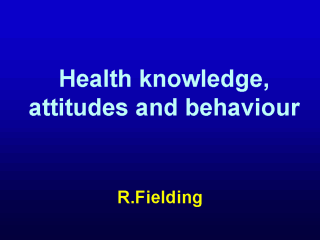 |
Synopsis:
This lecture follows on from the lecture: “What kills us?”. In the preceding lectures,
the argument has been developed that human behaviour and organization are the key
determinants of health, illness and disease. This lecture begins to explore two major
factors which are considered important in human behaviour - what people know (knowledge)
and the views people take of things (attitudes). Both of these underpin much research into
human health-related behaviour. For example, HIV/AIDS is a problem because of sexual
practices, lung cancer because people smoke tobacco, diabetes because of the diet and
activity patterns people have, GI cancers largely a result of the diet, smoking and
drinking patterns people have, together with food preservation and bacteriological
factors, while hypertension and coronary heart disease are both currently believed to
involve diet and activity, amongst other things. Why
and when people use health care resources are determined again by their actions. What
people do when they feel ill and the factors that influence their choices are also
strongly influenced by their attitudes. However, so far, models have not done a good job
of explaining much of the variation in human health related behaviour by simply
manipulating knowledge and attitudes. Despite this, considerable effort is being put into
influencing both knowledge and attitudes in attempts to improve both community and
individual health. |
